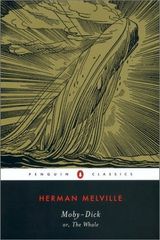Moby-Dick


Moby-Dick is a literary classic written by Herman Melville and first published in 1851. The novel tells the story of a whaling ship, the Pequod, and its captain, Ahab, who becomes obsessed with hunting down a giant white sperm whale named Moby-Dick. The novel has been praised for its vivid imagery, complex characters, and philosophical themes.
At its core, Moby-Dick is a novel about obsession, revenge, and the human condition. Ahab is a complex and compelling character who is driven to seek revenge on the whale that took his leg. As the novel progresses, it becomes clear that Ahab's obsession with Moby-Dick is consuming him, and he is willing to risk the lives of his crew and even his own life to hunt the whale.
One of the most remarkable aspects of Moby-Dick is its vivid descriptions of life aboard a whaling ship. Melville spent several years working on a whaling ship, and his firsthand experiences are evident in the book. From the grueling work of harvesting whale oil to the camaraderie and conflicts between the crew members, Melville paints a rich and detailed portrait of life at sea.
The novel is also known for its philosophical and symbolic themes. Many readers see Moby-Dick as a meditation on the nature of good and evil, the limits of human knowledge, and the relationship between humans and nature. The novel's famous opening line, "Call me Ishmael," is often seen as an invitation to explore the nature of identity and the human experience.
Despite its reputation as a difficult and dense novel, Moby-Dick is also a thrilling adventure story. The novel is filled with action, including several dramatic whale hunts and a final confrontation between Ahab and Moby-Dick that is both terrifying and awe-inspiring.
One of the challenges of reading Moby-Dick is its use of language. Melville's writing style is dense and complex, with many allusions and references to literature and philosophy. However, readers who take the time to unpack the novel's meaning and symbolism will be rewarded with a deep and thought-provoking reading experience.
Overall, Moby-Dick is a monumental work of literature that continues to captivate readers more than a century and a half after its publication. Melville's vivid characters, stunning imagery, and philosophical themes make the novel a timeless exploration of the human condition. While it can be a challenging read, it is also a rewarding one that will stay with readers long after they have turned the final page.